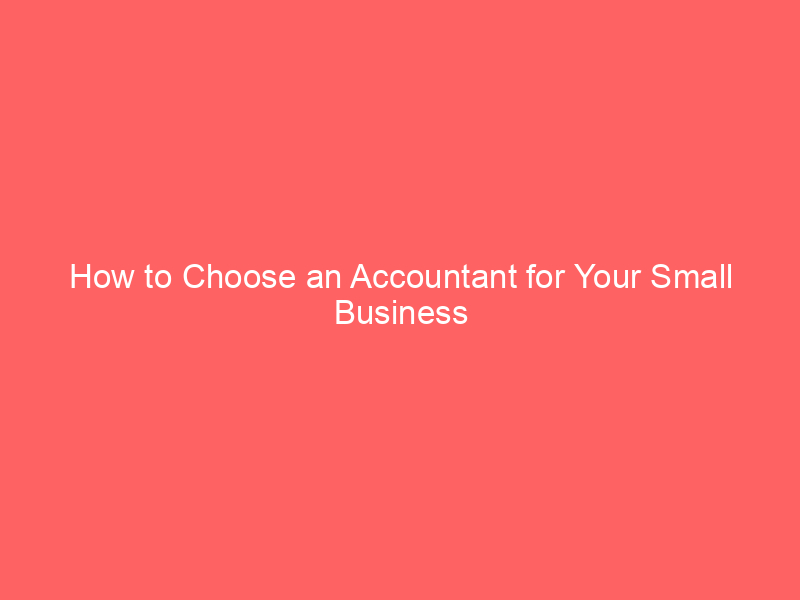If you’re running a small business, you might not think you need an accountant. However, an accountant can save you a lot of time and money by helping you to stay organized and on top of your finances. A good accountant will also be able to offer advice on financial matters, and can help you to save money on taxes. Choosing an accountant is an important decision for any small business owner. Here are a few tips on how to choose an accountant for your small business: 1. Decide what type of accountant you need. There are different types of accountants, and each type has different strengths. For example, there are certified public accountants (CPAs), who are licensed to provide auditing, taxation, and other financial services. There are also management accountants, who focus on helping businesses to manage their finances. 2. Consider your budget. Just like with any other service, you’ll need to consider your budget when choosing an accountant. Shop around and get quotes from a few different accountants to see what they charge. 3. Ask for recommendations. If you know other small business owners, ask them if they have any recommendations for accountants. You can also check online review sites to see what others have said about different accountants. 4. Meet with the accountant. Once you’ve narrowed down your choices, meet with the accountant to see if they’re a good fit for your business. Ask them about their experience working with businesses like yours, and find out what services they offer. 5. Make sure you’re comfortable with the accountant. It’s important that you feel comfortable communicating with your accountant. This is someone who will have access to sensitive financial information, so you need to be able to trust them. Choosing an accountant is an important decision for any small business owner. By following these tips, you can find an accountant who will be a good fit for your business and who can help you to save time and money.
1. Deciding What Type of Accountant You Need
When you’re running a small business, it’s important to have a good accountant to help you with your finances. But how do you know which type of accountant you need? Here are some things to consider when choosing an accountant for your small business: 1. What type of accounting services do you need? There are different types of accounting services, such as bookkeeping, tax preparation, and financial planning. You need to decide which type of services you need before you can choose an accountant. 2. What is your budget? Accountants charge different rates, so you need to decide how much you’re willing to spend on accounting services. Get quotes from several accountants before making a decision. 3. What are your accounting needs? You need to decide what type of accounting you need. For example, do you need someone to prepare your taxes or do you need someone to help you with your bookkeeping? 4. What are your business goals? You need to have a clear idea of your business goals before you can choose an accountant. This will help you choose an accountant who can help you achieve your goals. 5. What is your business structure? You need to know what type of business structure you have before you can choose an accountant. This information will help the accountant understand your business and your accounting needs. 6. What is your accounting software? You need to know what type of accounting software you use before you can choose an accountant. This information will help the accountant understand your business and your accounting needs. 7. What is your business location? You need to know where your business is located before you can choose an accountant. This information will help the accountant understand your business and your accounting needs. 8. What is your business size? You need to know how big your business is before you can choose an accountant. This information will help the accountant understand your business and your accounting needs. 9. What is your industry? You need to know what industry your business is in before you can choose an accountant. This information will help the accountant understand your business and your accounting needs. 10. What are your accounting records? You need to know what type of accounting records you have before you can choose an accountant. This information will help the accountant understand your business and your accounting needs.
2. Considering Your Budget
There are a few things you need to take into account when choosing an accountant for your small business. The first is your budget. You need to make sure you can afford the accountant’s fees. The second is the accountant’s qualifications and experience. You need to make sure the accountant is qualified to do the job. The third is the accountant’s personality. You need to make sure the accountant is someone you can work with. Once you’ve considered your budget, qualifications and experience, and personality, you can start to narrow down your search for an accountant. You can ask family and friends for recommendations, or search online for accountants in your area. Once you’ve found a few accountants you like, you can contact them to discuss your specific needs.
3. Asking for Recommendations
If you are a small business owner, you may be wondering how to choose an accountant. There are a few things you should keep in mind when making your decision. First, you will want to find an accountant who is familiar with the laws and regulations surrounding small businesses. This will ensure that your accountant can provide you with the best possible advice. Second, you will want to find an accountant who is willing to work with you on a regular basis. This will allow you to keep track of your finances and make sure that everything is in order. Third, you will want to find an accountant who is affordable. This is important because you do not want to spend more money than you have to on accounting services. When you keep these things in mind, you will be able to find an accountant who is right for your small business.
4. Meeting With the Accountant
When it comes to choosing an accountant for your small business, there are a few things you need to take into account. Here are four tips to help you choose the right accountant for your business: 1. Consider your business needs Before you start looking for an accountant, it’s important to take a step back and consider your business needs. What type of accounting services do you need? Do you need help with bookkeeping, tax returns, or both? Once you know what type of services you need, you can start looking for an accountant that specializes in those areas. 2. Ask for recommendations If you have any friends or family members who own small businesses, ask them for recommendations. They may have already worked with an accountant that they can recommend. 3. Look for an accountant with small business experience When you’re looking at different accountants, be sure to ask about their experience working with small businesses. You want to make sure they understand the unique challenges that small businesses face. 4. Get a free consultation Once you’ve narrowed down your options, it’s a good idea to get a free consultation from each of the accountants you’re considering. This will give you a chance to ask questions and get to know them better. It will also give you a chance to see how they work and what their process is like. Choosing the right accountant for your small business is an important decision. But if you take the time to consider your needs and do your research, you should be able to find an accountant that’s a good fit for your business.
5. Making Sure You’re Comfortable With the Accountant
When you’re running a small business, it’s important to have a good relationship with your accountant. After all, they’re the ones who will be keeping track of your finances and helping you to make important decisions about your business. Here are a few tips on how to choose an accountant for your small business: 1. Make sure you’re comfortable with them. This is probably the most important thing. You need to be able to trust and confide in your accountant. They should be someone you feel comfortable talking to about your finances. 2. Make sure they’re qualified. This may seem like an obvious one, but it’s important to make sure your accountant is qualified and experienced. Ask to see their qualifications and check that they’re registered with a professional body such as the Institute of Chartered Accountants in England and Wales (ICAEW). 3. Make sure they’re up to date. Your accountant should be up to date with the latest changes in tax law and accounting standards. This means they’ll be able to give you the best possible advice for your business. 4. Make sure they’re affordable. This is an important consideration, especially for small businesses. You need to make sure you can afford your accountant’s fees. Ask for quotes from a few different accountants to compare prices. 5. Make sure they’re local. This may not be an important consideration for everyone, but it can be helpful to have a local accountant. They’ll be familiar with the local business community and may be able to offer you useful advice and contacts.
6. Checking Their Certifications
When choosing an accountant for your small business, it’s important to check their certifications. There are a few different certifications that an accountant can have, but the most important one to look for is the Certified Public Accountant (CPA) designation. This designation is granted by the American Institute of Certified Public Accountants (AICPA) and it shows that the accountant has met the rigorous standards set by the AICPA. Other certifications to look for include the Certified Management Accountant (CMA) designation, which is granted by the Institute of Management Accountants (IMA), and the Certified Internal Auditor (CIA) designation, which is granted by the Institute of Internal Auditors (IIA). When looking at an accountant’s credentials, it’s also important to make sure that they are licensed to practice in your state. Each state has different requirements for licensure, so you’ll want to check with your state’s licensing board to see what the requirements are. In most states, an accountant must have a bachelor’s degree in accounting, pass a four-part exam, and have at least two years of experience working in the accounting field. Once you’ve verified that an accountant has the appropriate credentials and licensure, you can then start to narrow down your search by looking at other factors, such as their experience, their areas of expertise, and their fees. When it comes to experience, you’ll want to make sure that the accountant has experience working with businesses similar to yours in size and industry. As for areas of expertise, you’ll want to make sure that the accountant has experience with the specific type of accounting that you need, whether it’s tax accounting, financial accounting, or managerial accounting. Finally, when it comes to fees, you’ll want to get an estimate of the accountant’s hourly rate or flat fee for the services you need. With all of these factors in mind, you should be able to find an accountant that’s a good fit for your small business.
7. Seeing What Services They Offer
When it comes to choosing an accountant for your small business, there are a few things you should take into consideration. Here are a few tips on how to choose an accountant for your small business: 1. Make sure you choose an accountant that is qualified and experienced. 2. Ask around for recommendations from other small business owners. 3. Shop around and compare prices from different accountants. 4. Make sure you understand the services they offer and what their fees are. 5. Ask them for references from other clients. 6. Meet with them in person to get a feel for their personality and whether you would be able to work with them. 7. Ask them about their policies on confidentiality and data security. By following these tips, you should be able to find an accountant that is a good fit for your small business.
8. Understanding Their Fees
When you’re running a small business, it’s important to have a good accountant to help you with your finances. But how do you choose an accountant? Here are some things to consider: 1. What services do they offer? Make sure the accountant you choose offers the services you need. If you’re not sure what services you need, ask for a consultation to get a better idea of what they can do for you. 2. What are their fees? Be sure to ask about fees before you hire an accountant. Some accountants charge by the hour, while others charge a flat rate. There are also some who charge a percentage of your overall income. Make sure you know what their fees are so you can budget accordingly. 3. What is their experience? You want to make sure you hire an accountant with experience. Ask about their education and work experience to get an idea of their qualifications. 4. Do they have a good reputation? Check out online reviews and ask around to see what others think of the accountant you’re considering. You want to make sure you hire someone with a good reputation. 5. Do they offer a free consultation? Most accountants offer a free consultation so you can get to know them and their services. This is a great way to see if they’re a good fit for you. 6. What are their office hours? Make sure the accountant you choose has office hours that work for you. You don’t want to be stuck trying to reach them during times when they’re closed. 7. Are they accessible? You want to be able to reach your accountant when you need to. Make sure they have a good communication policy in place. 8. Do they have a good understanding of small businesses? It’s important to find an accountant who has a good understanding of small businesses. They should be familiar with the challenges and opportunities that come with running a small business. When you keep these things in mind, you’ll be able to choose an accountant that’s a good fit for your small business.
9. Discussing Your Business Goals
As a small business owner, it is important to choose an accountant that is a good fit for your business. There are a few things to consider when choosing an accountant, such as: 1. What are your business goals? 2. What is your budget? 3. What services does the accountant offer? 4. What is the accountant’s experience? 5. Does the accountant have a good reputation? 6. What is the accountant’s communication style? 7. Is the accountant accessible? 8. What is the accountant’s policy on confidentiality? 9. What are the accountant’s qualifications? When you are considering these factors, it is also important to keep in mind your personal preferences. You will be working closely with your accountant, so it is important to choose someone you are comfortable with and who you feel you can trust.
10. Asking About Their Experience
When you are a small business owner, it is important to have a good accountant to help you with your finances. Here are some tips on how to choose an accountant for your small business: 1. Ask around for recommendations. Talk to other small business owners in your industry and see who they use and why they like them. 2. Research different accounting firms. Once you have a few recommendations, do some research on the different firms to see which one would be the best fit for your business. 3. Consider your needs. What services do you need from an accountant? Make sure the firm you choose offers those services. 4. Get a free consultation. Most accounting firms offer free consultations, so take advantage of that and meet with a few different firms. This will give you a chance to see who you feel most comfortable with. 5. Ask about pricing. Once you’ve narrowed down your choices, ask about pricing. Some firms charge by the hour, while others have fixed rates for certain services. Make sure you know what you’re being charged before you commit to anything. By following these tips, you should be able to find a great accountant for your small business.
11. Getting a Referral
There are a few key things to keep in mind when choosing an accountant for your small business. Here are a few tips: 1. Make sure they have experience with small businesses. You want someone who understands the unique challenges and opportunities that come with running a small business. 2. Ask for referrals from other small business owners. Talk to people you trust and see who they recommend. 3. Get a free consultation. Many accounting firms offer free consultations, so take advantage of this and meet with a few different firms before making your decision. 4. Consider your needs. What services do you need from an accountant? Make sure the firm you choose offers the services you need. 5. Ask about pricing. Accounting services can be expensive, so you’ll want to make sure you’re getting a good value for your money. 6. Check out their website. A professional, up-to-date website is a good sign that an accounting firm is keeping up with the times. 7. Make sure they’re licensed and insured. This is important for protecting your business in case of any problems. 8. Ask about their experience. How long have they been in business? Do they have experience with businesses like yours? 9. Get a second opinion. Once you’ve narrowed down your choices, get a second opinion from someone you trust before making your final decision. 10. Trust your gut. Ultimately, you’ll want to choose an accountant that you feel comfortable with and that you trust to do a good job.
12. Checking Online Reviews
When you’re running a small business, it’s important to have a good accountant. They can help you with your tax returns, bookkeeping, and financial planning. But how do you choose an accountant? Here are a few tips: 1. Do your research Before you start meeting with potential accountants, do your research. Look for accountants who specialize in small businesses, and read online reviews. You can also ask your friends or business associates for recommendations. 2. Know what you need Before you meet with an accountant, know what services you need. Do you need help with your tax return? Do you need someone to do your bookkeeping? Make a list of the services you need, so you can find an accountant who can help you. 3. Ask for referrals When you meet with an accountant, ask for referrals. A good accountant will be happy to give you the names of some of their clients. This will give you a chance to talk to other small business owners and get their opinion of the accountant. 4. Get a free consultation Most accountants will offer a free consultation. This is a great opportunity to meet with the accountant and get a feel for their personality and how they do business. 5. Ask about fees Before you hire an accountant, be sure to ask about fees. Find out how much they charge for their services, and whether they offer any discounts for small businesses. Choosing an accountant is an important decision for your small business. By following these tips, you can find an accountant who will be a good fit for your business.
13. Meeting With More Than One Accountant
When you’re running a small business, it’s important to have a good accountant to help you with your finances. But how do you choose an accountant? There are a few things you should consider when choosing an accountant for your small business. First, you need to decide what type of accounting services you need. Do you need someone to help you with your taxes? Do you need someone to help you with your bookkeeping? Do you need someone to help you with both? Once you know what type of accounting services you need, you can start looking for an accountant. You can ask for recommendations from friends or business associates. You can also search online for accounting firms that specialize in small businesses. When you’ve found a few potential accountants, you should set up meetings with them to get to know them better. During the meetings, you should ask them about their experience working with small businesses, what services they offer, and how much they charge. You should also ask them for references from other small businesses. Once you’ve talked to the references, you’ll have a better idea of whether or not the accountant is a good fit for your business. After you’ve met with a few different accountants, you can start to narrow down your choices. Choose the accountant that you feel most comfortable with and that you think will be the best fit for your business.
If you’re running a small business, you might not think you need an accountant. However, an accountant can save you a lot of time and money by helping you to stay organized and on top of your finances. A good accountant will also be able to offer advice on financial matters, and can help you to save money on taxes. Choosing an accountant is an important decision for any small business owner. Here are a few tips on how to choose an accountant for your small business: 1. Decide what type of accountant you need. There are different types of accountants, and each type has different strengths. For example, there are certified public accountants (CPAs), who are licensed to provide auditing, taxation, and other financial services. There are also management accountants, who focus on helping businesses to manage their finances. 2. Consider your budget. Just like with any other service, you’ll need to consider your budget when choosing an accountant. Shop around and get quotes from a few different accountants to see what they charge. 3. Ask for recommendations. If you know other small business owners, ask them if they have any recommendations for accountants. You can also check online review sites to see what others have said about different accountants. 4. Meet with the accountant. Once you’ve narrowed down your choices, meet with the accountant to see if they’re a good fit for your business. Ask them about their experience working with businesses like yours, and find out what services they offer. 5. Make sure you’re comfortable with the accountant. It’s important that you feel comfortable communicating with your accountant. This is someone who will have access to sensitive financial information, so you need to be able to trust them. Choosing an accountant is an important decision for any small business owner. By following these tips, you can find an accountant who will be a good fit for your business and who can help you to save time and money.






